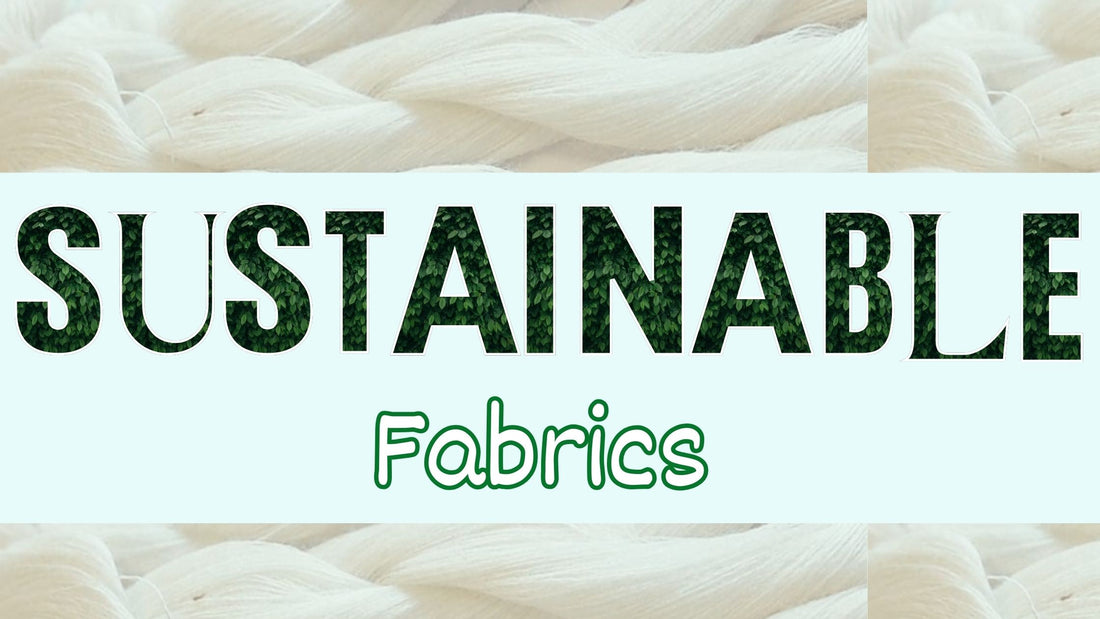
Breaking Down Sustainable Fabrics: What to Look For and Why It Matter
Share

Hey there, eco-fashion enthusiasts! As someone who's diving into the world of sustainable fashion with Bunko Junko, I've learned a lot about how the fabrics we use can make a big difference in our mission to create eco-friendly, stylish products. Whether you're new to sustainable shopping or just curious about the materials that go into your clothes, this blog will help break down what makes a fabric sustainable and why it matters for both the planet and your wardrobe. Plus, I’ll share how Bunko Junko incorporates these sustainable practices, especially through our favorite: upcycled pre-consumer denim waste. Let’s get into it!
What Makes a Fabric Sustainable?
Before we jump into the specifics, let’s talk about what actually makes a fabric sustainable. Sustainable fabrics are typically those that have a lower environmental impact throughout their life cycle—from production to disposal. They might be made from renewable resources, have a lower carbon footprint, use fewer chemicals, or be biodegradable. Here are a few key things to look for when shopping sustainably:
1. Low Water Usage: Some fabrics, like organic cotton or recycled materials, use significantly less water in their production compared to conventional options.
2. Reduced Chemical Use: Fabrics that are organic or naturally dyed reduce the reliance on harmful chemicals, which is better for both the environment and the people involved in the manufacturing process.
3. Durability and Longevity: Sustainable fabrics are often chosen for their durability, meaning they’ll last longer and reduce the need for frequent replacements.
4. Recycled or Upcycled Materials: Using fabrics that are recycled or upcycled helps divert waste from landfills and reduces the demand for virgin resources.
Sustainable Fabrics and Their Benefits
Now, let’s break down some of the most popular sustainable fabrics out there, along with why they’re great choices for eco-friendly fashion lovers.
1. Organic Cotton:
- Why It’s Sustainable: Grown without synthetic pesticides or fertilizers, organic cotton is better for the soil, water, and farmers.
- Benefits: Soft, breathable, and often used in casual wear, bedding, and more.
2. Recycled Polyester:
- Why It’s Sustainable: Made from recycled plastic bottles, this fabric helps reduce plastic waste and the use of new resources.
- Benefits: Durable, moisture-wicking, and often used in activewear.
3. Linen:
- Why It’s Sustainable: Linen is made from flax plants, which require minimal water and pesticides to grow.
- Benefits: Breathable, biodegradable, and great for warm-weather clothing.
4. Hemp:
- Why It’s Sustainable: Hemp grows quickly, requires little water, and naturally fertilizes the soil.
- Benefits: Strong, durable, and softens with each wash.
Bunko Junko’s Upcycled Denim: A Star in Sustainable Fashion
At Bunko Junko, our go-to sustainable fabric is upcycled denim, specifically pre-consumer denim waste. This means we take leftover denim from the production process—pieces that would otherwise be thrown away—and turn them into stylish, high-quality products. Here’s why we love it:

- Reducing Waste: By using pre-consumer denim waste, we’re directly reducing the amount of fabric that ends up in landfills.
- Energy and Water Savings: Denim production is resource-intensive, but by upcycling, we avoid the energy and water costs associated with creating new fabric.
- Unique Designs: Each upcycled denim product has its own character and story, making every piece truly one-of-a-kind.
Tips for Shopping Sustainably
When you’re out shopping, whether it’s for a new outfit or a gift, keep these tips in mind to make more sustainable choices:
1. Check Labels for Fabric Content: Look for materials like organic cotton, linen, hemp, or recycled fibers. Avoid synthetics like conventional polyester or nylon unless they’re recycled.
2. Ask About the Brand’s Practices: Don’t be afraid to ask brands about their sustainability practices. Are they transparent about their sourcing? Do they prioritize ethical labor?
3. Think About Longevity: Invest in pieces that are well-made and versatile. The longer a product lasts, the less often you’ll need to replace it, which is a win for your wallet and the planet.
4. Support Upcycled Products: Choosing upcycled items, like those from Bunko Junko, supports a circular economy where materials are reused instead of discarded.
Conclusion
Sustainable fabrics are at the heart of eco-friendly fashion, and understanding what makes a fabric sustainable is the first step in making better choices. At Bunko Junko, we’re proud to be part of this movement with our upcycled Textile creations, turning waste into wearable art. Next time you shop, remember the impact of your choices—every sustainable purchase is a step towards a greener future!
So, whether you’re picking up an upcycled denim bag or a cozy organic cotton top, know that you’re making a difference. Happy sustainable shopping!
